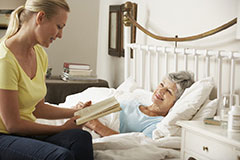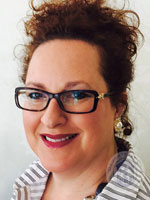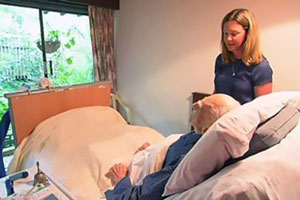The article on ABC News about in home palliative care, plus the discussion on ‘Q & A’ on ABC with Andrew Denton on End of Life care has reminded me that Daughterly Care has a lot of valuable information on how we provide Palliative Care and End of Life Care.
It is not a surprise that the vast majority of Elders prefer to die at home. Their least preferred places to die are in a hospital or a Nursing Home.
Did you know that fewer than 20 per cent of Elderly Australians die at home?
Despite studies consistently showing that between 70 and 80 per cent would like to die in their own home / house. This is also stated in the ABC article and on our Palliative Care page.
In the words of Mr Griffin (pictured on the right), “Home is my home and I feel more comfortable here than what I do at the hospital”.
Ms Archer said, her partner had seen other people die in institutions, and he did not want that to happen to him.
Andrew Denton on ABC’s Q&A talked about the need for medically assisted euthanasia. This has generated much community debate…
… As you can see from these newspaper articles:
Daughterly Care does not have a position on the ‘E’ topic. Our role is to support our elderly clients and care for them the way they want to be cared for.
Suffice to make the following points, after 21 years of providing palliative and End of Life care for our dying and gravely ill clients:
- We understand all the arguments from varying perspectives;
- We don’t ever want Elderly, disabled or terminally ill people to feel that they don’t have the human right to live for ALL their days and to receive quality home nursing support that they need to live a dignified End of Life;
- We see ‘client after client’ where their will to live is very strong. Very strong. Stronger than you or I might imagine;
- How a person judges or measures the quality of their own life changes as their health changes. Where a younger, healthy, able-bodied person might look at a life and not see ‘quality of life’. In contrast, bed-bound Elders do hold our Hourly Caregivers or Live in Carers’ hands and say “I want to live longer” and they do state they still have “quality of life”.
- The simple fact is how that person judges the quality of their life, which is generally determined by their journey and only that person can know if they experience quality of life. This is where we have to be careful because we might think that if X then we would want to end our life…but when we reach X we still feel we have a quality of life and still want to live;
- We are very fortunate that our terminally ill or elderly clients live in areas that are well supported by the Community Palliative Care Team, their family and Daughterly Care so dying at home is comfortable, pain free and dignified.
The in Home Palliative Care Program
The in Home Palliative Care Program began in late 2013 as part of a NSW Government initiative. The NSW Government funds 48 hours of in Home End of Life for people who are in the “approximate last week of their life” and prefer to die at home.
Our clients are able to take full advantage of the 48 hours of Government Funded End of Life Care because…
…the Government provides funding to a consortium to help terminally ill patients die in their own home and they outsource the care to us to maintain consistency of care.
This way our client can rest easy knowing they can spend their last days cared for by the same Caregivers and nurses they know and trust.

This practical approach makes a lot of sense. When your Loved One is dying it’s a very sensitive, highly emotional and tiring time. The last thing you want is a lot of new and different people coming through your home. In addition, you want the security and peace of mind that you are being cared for by people you already feel comfortable with and trust. End of Life Care is a very specialised type of care.
Over the decades of providing Palliative Care and End of Life Care we have found that the person receiving the in home care and their family is far more at ease with the Caregivers who have been providing the Palliative Care remain during the End of Life stage.
The Care Workers already have an established relationship with the client and family. They know the terminally ill or elderly client’s body language which is invaluable knowledge during this time. An added bonus of continuing with our Hourly Caregivers or Live in Carers is that it reduces the number of people in the home during the last 48 hour or 24 hr period which makes the journey easier for those all involved.
12 of our Live in Care clients have died in the last 4 months and Daughterly Care has provided the Palliative and End of Life Care for those 12 terminally ill or elderly private care clients. They have all passed over peacefully, pain free and surrounded by their family or us.
You offer a wonderful service and you definitely live up to the promises you make on your website. I was sceptical when I read the website but you really delivered everything you had promised.
Please thank the wonderful livein carers who looked after my Mother in the last few weeks. I would recommend this Daughterly Care’s Live in Care to anyone. Michele said Vera in particular were wonderful.
Mum came alive again when she got home from the hospital. She was so happy to be at home. The doctors at the hospital said that Mum was being looked after so well that nobody would have been able to pick up that she developed pneumonia. Mum did not even have a temperature or a cough.
Thank you again, Kathy [Daughterly Care’s High Care Case Manager] for making my Mother so happy in her last few weeks.
Specialised Care needed for people living with dementia
Daughterly Care also specialises in caring for people living with dementia and in this case, our Caregiver’s skills and wisdom are important reasons to not change Hourly Caregivers or Live in Carers in the last two weeks of their life.
Conclusion
Our page on Palliative Care, it explains how Daughterly Care always works with the free Community Palliative Care Doctors and Nurses because of their invaluable expertise.
Read about what makes a good death here.
Discover what happens in the last days of life but you are too afraid to ask.
If you would like to talk to one of our Registered Private Nurses about Palliative or End of Life Care for your Loved One at home, we’d be honoured to speak with you about what is involved and your in home care options. We can support you through that journey, in a number of different ways. Ring us now on 02 9970 7333.

Warmly,
Kate
Kylie Lambert B.Ec F Fin
(known to her friends for 25 years as Kate)
Daughterly Care CEO, Co-Founder and Owner


Working as a Caregiver for palliative clients in their home has enhanced the client and families transition via a gentle, quiet, supportive and controlled environment. My work as a professional palliative care worker has also taken me to do this work in a Nursing Home. There is NO comparison when it comes to being where the client is more comfortable and supported by the Palliative care team and professional Caregivers at home.
What did Dorothy from the Wizard of Oz say … “There’s no place like home’. Thanks for sharing Wendy.
You’re right Wendy, there is no comparison.
Daughterly Care provided the end of life care for a GP Dr recently and he had a gentle, peaceful and really JOYFUL and meaningful last week of his life. He lived joyfully until he died. His wife slept in the bed with him for his last night on planet earth and his 20 year old grand-daughter laid on the bed the day he died re-telling stories from their special times together “poppy remember when…” all in the privacy and serenity of his own home. Another soul passes over gently, peacefully at home.
Opps hit the post button early…
I wanted to finish by saying… it’s all because of the lovely Caregivers like you Wendy, and our Private Nurses working together with the family and the Palliative Care team who are brilliant. You make it possible for souls to pass over gently, gracefully and surrounded by love. Thank you for the amazing work you do as part of that team.